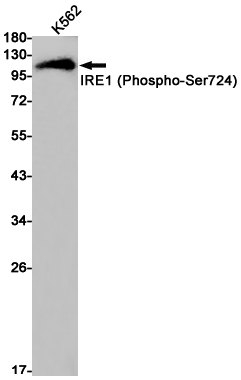-
Product Name
Anti-Phospho-IRE1 (Ser724) Rabbit antibody
- Documents
-
Description
Phospho-IRE1 (Ser724) Rabbit polyclonal antibody
-
Tested applications
WB
-
Species reactivity
Human
-
Alternative names
IRE1b; IRE2p; hIRE2p; IRE1-BETA antibody
-
Isotype
Rabbit IgG
-
Preparation
Antigen: A synthetic phosphopeptide corresponding to residues surrounding Ser724 of human IRE1
-
Clonality
Polyclonal
-
Formulation
Supplied in 50nM Tris-Glycine(pH 7.4), 0.15M Nacl, 40%Glycerol, 0.01% sodium azide and 0.05% BSA.
-
Storage instructions
Store at -20°C. Stable for 12 months from date of receipt.
-
Applications
WB: 1/1000-1/5000
-
Validations

Western blot detection of IRE1 (Phospho-Ser724) in K562 cell lysates using IRE1 (Phospho-Ser724) Rabbit pAb(1:1000 diluted).Predicted band size:110kDa.Observed band size:110kDa.
-
Background
Swiss-Prot Acc.O75460.Serine/threonine-protein kinase and endoribonuclease that acts as a key sensor for the endoplasmic reticulum unfolded protein response (UPR) (PubMed:11779464, PubMed:11175748, PubMed:12637535, PubMed:9637683, PubMed:21317875). In unstressed cells, the endoplasmic reticulum luminal domain is maintained in its inactive monomeric state by binding to the endoplasmic reticulum chaperone HSPA5/BiP (PubMed:21317875). Accumulation of misfolded protein in the endoplasmic reticulum causes release of HSPA5/BiP, allowing the luminal domain to homodimerize, promoting autophosphorylation of the kinase domain and subsequent activation of the endoribonuclease activity (PubMed:21317875). The endoribonuclease activity is specific for XBP1 mRNA and excises 26 nucleotides from XBP1 mRNA (PubMed:11779464, PubMed:24508390, PubMed:21317875). The resulting spliced transcript of XBP1 encodes a transcriptional activator protein that up-regulates expression of UPR target genes (PubMed:11779464, PubMed:24508390, PubMed:21317875). Acts as an upstream signal for ER stress-induced GORASP2-mediated unconventional (ER/Golgi-independent) trafficking of CFTR to cell membrane by modulating the expression and localization of SEC16A (PubMed:21884936, PubMed:28067262).
Related Products / Services
Please note: All products are "FOR RESEARCH USE ONLY AND ARE NOT INTENDED FOR DIAGNOSTIC OR THERAPEUTIC USE"
